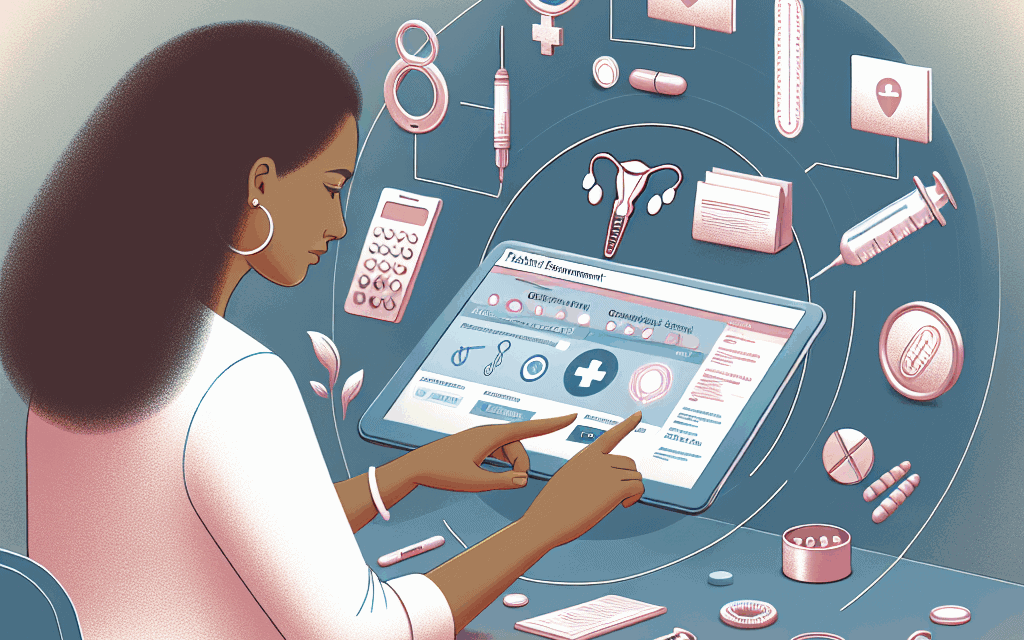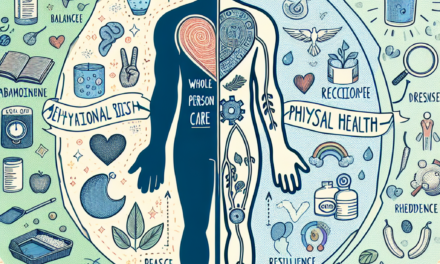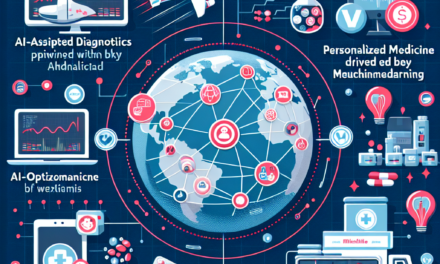Enhancing Patient Empowerment: How Digital Platforms Transform Birth Control Education and Access
In recent years, the landscape of healthcare has undergone a significant transformation, particularly in the realm of reproductive health. Digital platforms have emerged as powerful tools for enhancing patient empowerment, especially in the area of birth control education and access. This article explores how these platforms are reshaping the way individuals learn about, access, and manage their birth control options. We will delve into five key subtopics: the evolution of birth control education, the role of telehealth in reproductive health, the impact of mobile applications, the importance of community support and peer networks, and the future of digital platforms in birth control access.
The Evolution of Birth Control Education
Historically, birth control education has been fraught with misinformation, stigma, and limited access to reliable resources. Traditional methods of education often relied on in-person consultations, which could be intimidating for many individuals. However, the advent of digital platforms has revolutionized this landscape, making information more accessible and user-friendly.
Digital platforms provide a wealth of information on various birth control methods, including hormonal contraceptives, intrauterine devices (IUDs), barrier methods, and natural family planning. These platforms often feature:
- Comprehensive Resources: Websites and apps offer detailed descriptions of each method, including effectiveness rates, side effects, and user experiences.
- Interactive Tools: Many platforms include quizzes and calculators that help users determine the best birth control method for their lifestyle and health needs.
- Expert Insights: Access to articles, videos, and webinars led by healthcare professionals can demystify complex topics and provide evidence-based information.
For instance, platforms like Planned Parenthood and Bedsider have made significant strides in providing accurate and accessible information. Bedsider, in particular, offers a user-friendly interface that allows individuals to explore different birth control options and find clinics nearby. This shift towards digital education has empowered users to make informed decisions about their reproductive health.
Moreover, the rise of social media has played a crucial role in disseminating information. Influencers and health advocates use platforms like Instagram and TikTok to share personal stories and educational content, reaching a broader audience. This grassroots approach helps to normalize conversations around birth control and reproductive health, reducing stigma and encouraging individuals to seek the information they need.
The Role of Telehealth in Reproductive Health
Telehealth has emerged as a vital component of modern healthcare, particularly in the context of reproductive health. The COVID-19 pandemic accelerated the adoption of telehealth services, allowing individuals to access healthcare professionals from the comfort of their homes. This shift has been particularly beneficial for those seeking birth control services.
Telehealth offers several advantages for birth control access:
- Convenience: Patients can schedule virtual appointments at their convenience, eliminating the need for travel and reducing wait times.
- Privacy: Many individuals feel more comfortable discussing sensitive topics like birth control in a private setting, away from judgmental eyes.
- Increased Access: Telehealth can bridge the gap for individuals in rural or underserved areas who may have limited access to healthcare facilities.
For example, companies like Nurx and Simple Health have pioneered telehealth services specifically for birth control. Users can complete an online questionnaire, consult with a licensed healthcare provider, and receive prescriptions delivered directly to their homes. This model not only streamlines the process but also empowers individuals to take control of their reproductive health without the barriers often associated with traditional healthcare settings.
Research supports the effectiveness of telehealth in reproductive health. A study published in the journal Contraception found that telehealth consultations for birth control were as effective as in-person visits, with high patient satisfaction rates. This evidence underscores the potential of telehealth to enhance patient empowerment by providing accessible and efficient care.
The Impact of Mobile Applications
Mobile applications have become an integral part of the digital health landscape, offering users personalized tools for managing their birth control. These apps not only provide educational resources but also facilitate tracking and reminders, enhancing user engagement and adherence to contraceptive methods.
Key features of birth control apps include:
- Tracking and Reminders: Many apps allow users to log their menstrual cycles, track pill usage, and set reminders for taking their birth control, which can improve adherence rates.
- Personalized Recommendations: Some apps use algorithms to suggest birth control methods based on user preferences and health profiles.
- Community Support: Many apps include forums or chat features where users can connect with others, share experiences, and seek advice.
One notable example is Clue, a menstrual cycle tracking app that has expanded its features to include birth control management. Clue not only helps users track their cycles but also provides educational content about various contraceptive methods. This holistic approach empowers users to understand their bodies better and make informed choices about their reproductive health.
Research indicates that mobile apps can significantly enhance user engagement and knowledge. A study published in the journal Health Education Research found that users of birth control apps reported increased confidence in their contraceptive choices and improved adherence to their prescribed methods. This highlights the potential of technology to empower individuals in managing their reproductive health.
The Importance of Community Support and Peer Networks
Community support plays a crucial role in enhancing patient empowerment, particularly in the context of reproductive health. Digital platforms have facilitated the creation of online communities where individuals can share experiences, seek advice, and provide support to one another.
Online forums and social media groups dedicated to birth control and reproductive health offer several benefits:
- Shared Experiences: Individuals can learn from others’ experiences with different birth control methods, helping them make informed decisions.
- Emotional Support: Discussing sensitive topics in a supportive environment can alleviate feelings of isolation and anxiety.
- Access to Diverse Perspectives: Online communities often include individuals from various backgrounds, providing a broader understanding of how cultural factors influence birth control choices.
Platforms like Reddit and Facebook host numerous groups focused on reproductive health, where members can ask questions and share insights. For instance, the subreddit r/birthcontrol has thousands of members discussing everything from side effects to personal anecdotes about different contraceptive methods. This peer-to-peer support can be invaluable for individuals navigating their birth control options.
Moreover, organizations like the American College of Obstetricians and Gynecologists (ACOG) have recognized the importance of community support in reproductive health. They encourage healthcare providers to direct patients to reputable online communities where they can find support and information. This approach not only empowers individuals but also fosters a sense of belonging and shared understanding.
The Future of Digital Platforms in Birth Control Access
The future of digital platforms in birth control education and access looks promising, with ongoing advancements in technology and a growing emphasis on patient empowerment. As more individuals turn to digital solutions for their healthcare needs, several trends are likely to shape the landscape of reproductive health.
Key trends to watch include:
- Integration of Artificial Intelligence: AI-driven tools may provide personalized recommendations and support, enhancing user experience and engagement.
- Expansion of Telehealth Services: As telehealth becomes more mainstream, we can expect an increase in services specifically tailored to reproductive health.
- Enhanced Data Privacy: With growing concerns about data security, platforms will need to prioritize user privacy and transparency in how data is collected and used.
Additionally, the integration of digital platforms with traditional healthcare systems could create a more seamless experience for patients. For example, healthcare providers may begin to use digital tools to monitor patient adherence and provide real-time support, further enhancing patient empowerment.
As we look to the future, it is essential to continue advocating for equitable access to digital platforms, ensuring that all individuals, regardless of socioeconomic status or geographic location, can benefit from these advancements. Policymakers, healthcare providers, and technology developers must work together to create inclusive solutions that prioritize patient empowerment in reproductive health.
Conclusion
The transformation of birth control education and access through digital platforms represents a significant step forward in enhancing patient empowerment. By providing comprehensive resources, facilitating telehealth services, offering mobile applications, fostering community support, and embracing future technological advancements, these platforms are reshaping the way individuals engage with their reproductive health.
As we continue to navigate this evolving landscape, it is crucial to prioritize equitable access to information and services, ensuring that all individuals can make informed choices about their birth control options. The journey towards patient empowerment in reproductive health is ongoing, but with the support of digital platforms, individuals are better equipped than ever to take control of their reproductive futures.





